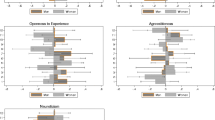Abstract
Employing Holland's personality theory ofoccupational decision making, this study explores howpersonality-career fit influences initial medical careeraspirations among college freshmen, and the extent to which such fit is associated with themaintenance or abandonment of those aspirations.Personality types thought to be common among physicians(Holland's investigative, social, or artistic types) are predictive of aspiring to a medicalcareer-findings that validate the importance of“fit” between an individual's personalityand career choice generally, and the choice of medicinespecifically. Moreover, the personality characteristics ofstudents are related to the careers they later choose asalternatives to medicine. Overall, these findingsprovide additional support for Holland's occupational decision-making theory of personality-careerfit, and illustrate how personality characteristics aresystematically associated with changes in career choiceduring college.
Similar content being viewed by others
REFERENCES
Antony, J. (1996). Factors influencing college students' abandonment of medical career aspirations. Unpublished doctoral dissertation. University of California, Los Angeles.
Antony, J. (1997). Personality-career fit as a driving mechanism behind men's and women's medical career aspirations during college. Paper presented at the annual meeting of the American Educational Research Association, Chicago, IL.
Association of American Medical Colleges (1994). Medical School Admissions Requirements. Washington, DC: Author.
Astin, A. W. (1977). Four Critical Years. San Francisco, CA: Jossey Bass.
Astin, A. W. (1993). What Matters in College: Four Critical Years Revisited. San Francisco, CA: Jossey Bass.
Astin, A. W. and Panos, R. (1969). The Educational and Vocational Development of College Students. Washington, D.C.: American Council on Education.
Astin, H. S. (1984). The meaning of work in women's lives: A sociopsychological model of career choice and work behavior. Counseling Psychologist12(3–4): 117-126.
Brown, D., Brooks, L., & Associates (1984). Career Choice and Development. San Francisco, CA: Jossey-Bass Inc.
Chronicle of Higher Education (1992). The Almanac of Higher Education. Chicago, IL: University of Chicago Press.
Davis, J. (1965). Undergraduate Career Decisions: Correlates of Occupational Choice. Chicago, IL: Aldine.
Dey, E. L., Astin, A. W., and Korn, W. S. (1991). The American Freshman: Twenty-five Year Trends. Los Angeles, CA: University of California, Graduate School of Education and Information Studies, Higher Education Research Institute.
Feldman, K., and Newcomb, T. (1969). The Impact of College on Students. San Francisco, CA: Jossey-Bass.
Fenske, R., and Scott, C. (1973). College students' goals, plans, and background characteristics: A synthesis of three empirical studies. Research in Higher Education1: 101-118.
Hansen, L. S. (1997). Integrative Life Planning: Critical Tasks for Career Development and Changing Life Patterns. San Francisco, CA: Jossey-Bass.
Henry, P. (1988). Holland's hexagonal model applied to nontraditional premedical students. Psychological Reports62: 399-404.
Henry, P. (1989). Relationship between academic achievement and measured career interest: Examination of Holland's theory. Psychological Reports64: 35-40.
Henry, P., and Bardo, H. R. (1987). Expressed occupational choice of nontraditional premedical students as measured by the Self-Directed Search: An investigation of Holland's theory. Psychological Reports60: 575-581.
Hind, R., and Wirth, T. (1969). The effect of university experience on occupational choice among undergraduates. Sociology of Education42: 50-70.
Holland, J. L. (1959). A theory of vocational choice. Journal of Counseling Psychology6: 35-45.
Holland, J. L. (1962). Some explorations of a theory of vocational choice: I. One-and two-year longitudinal studies. Psychological Monographs76(26): 1-545.
Holland, J. L. (1966). The Psychology of Vocational Choice. Waltham, MA: Blaisdell.
Holland, J. L. (1982). The SDS helps both females and males: A comment. Vocational Guidance Quarterly30(3): 195-197.
Hurtado, S., Astin, A,, Korn, W., and Dey, E. (1989). The American College Student, 1987: National Norms for 1983 and 1985 College Freshmen. UCLA Higher Education Research Institute: Los Angeles, CA.
Katz, M. (1963). Decisions and Values: A Rationale for Secondary School Guidance. New York: College Entrance Examination Board.
Klein, K. L., and Weiner, Y. (1977). Interest congruency as a moderator of relationship between job tenure and job satisfaction and mental health. Journal of Vocational Behavior19: 91-98.
Menard, S. (1995). Applied Logistic Regression Analysis. Thousand Oaks, CA: Sage Publications.
Parsons, F. (1909). Choosing a Vocation. Boston, MA: Houghton Mifflin.
Pascarella, E. T., Brier, E. M., Smart, J. C., and Herzog, L. (1987). Becoming a physician: The influence of the undergraduate experience. Research in Higher Education26(2): 180-201.
Peters, R. L. (1986). Getting What You Came For: The Smart Student's Guide to Earning a Master's or a Ph.D.New York: Noonday Press.
Werts, C. E. (1968). Parental influence on career choice. Journal of Counseling Psychology15: 48-52.
Williamson, E. G. (1965). Vocational counseling: Trait and factor theory. In B. Stefflre (ed.), Theories of Counseling. New York: McGraw-Hill Book Company.
Zaccaria, J. S. (1970). Theories of Occupational Choice and Vocational Development. Boston, MA: Houghton Mifflin Company.
Rights and permissions
About this article
Cite this article
Antony, J.S. PERSONALITY-CAREER FIT AND FRESHMAN MEDICAL CAREER ASPIRATIONS: A Test of Holland's Theory. Research in Higher Education 39, 679–698 (1998). https://doi.org/10.1023/A:1018762008742
Issue Date:
DOI: https://doi.org/10.1023/A:1018762008742




